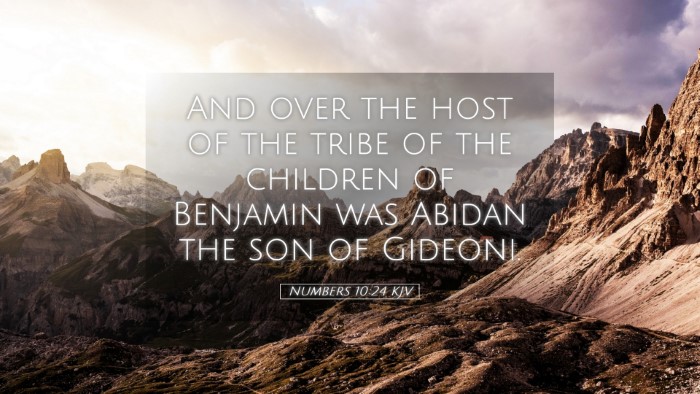Commentary on Numbers 10:24
Numbers 10:24 describes the formation of the divisions of the children of Israel as they journey through the wilderness, specifically focusing on the tribe of Ephraim and its leader, Elishama. This passage holds significant meaning as it illustrates God's order and organization in the midst of their travels.
Contextual Background
The Book of Numbers is pivotal in recounting the experiences of the Israelites during their 40-year sojourn in the wilderness. It serves both as a historical record and a theological document that outlines the law and God's covenant with His people. This particular verse falls within a section that describes the organization of the Israelite camp and their procession.
Exegesis of Numbers 10:24
- Leadership in the Camp: The mention of Elishama, the son of Amihud, as the leader of Ephraim indicates the importance of established leadership within the community. As Matthew Henry notes, the leaders were appointed to ensure that God's commands were executed swiftly and effectively.
- The Role of Ephraim: Ephraim, as one of the prominent tribes, signifies strength and leadership (Genesis 48:19). Albert Barnes highlights this tribe's positioning in the forefront as a symbol of God's favor and guidance, demonstrating that God leads His people with foresight and care.
- Order and Structure: Adam Clarke emphasizes the meticulous organization of the camp. Each tribe had its designated leader and position, symbolizing unity and purpose among the people of Israel. This organizational structure reflects God’s intent for His people to function harmoniously in their mission.
Theological Implications
The passage speaks volumes about God's desire for order amidst chaos. The Israelites faced numerous challenges during their journey; however, through divine leadership and organization, they were able to maintain their identity as God's chosen people.
- Divine Guidance: The structuring of the camp, with each tribe assigned specific roles, is indicative of God's ongoing guidance in our lives. Barnes mentions that just as God directed the Israelites, believers today can rest assured that God continues to direct our paths.
- Responsibility of Leadership: Elishama's leadership role reflects the burdens of responsibility shouldered by those in spiritual authority. Henry notes that leaders are to guide, protect, and serve their communities with wisdom and diligence.
- Unity in Diversity: The integration of various tribes illustrates that, while they are distinct, they are united under the common goal of glorifying God. Clarke discusses how this diversity within the community strengthens their overall mission.
Practical Applications
For pastors and church leaders, Numbers 10:24 serves as a timely reminder to foster unity among diverse groups within the church. Each member, like the tribes of Israel, has a role to play in the body of Christ (1 Corinthians 12:12-27).
- Promote Organizational Structure: Just as the Israelites had their leaders, church leaders should seek to establish a clear organizational structure that empowers each member to contribute their gifts and talents effectively.
- Encourage Diversity in Leadership: Embrace the unique backgrounds and strengths of church members as valuable assets to the ministry, much like the distinct tribes of Israel were essential for their collective journey.
- Seek Divine Guidance: Continuous prayer and seeking God’s direction is vital in decision-making and leadership, echoing the reliance the Israelites had on God's guidance throughout their travels.
Conclusion
In summary, Numbers 10:24 encapsulates the themes of leadership, divine order, and community among the people of Israel. Its rich theological insights remain relevant for today's church, emphasizing the importance of unity, structured leadership, and the necessity of seeking God's guidance.
This verse and its commentary encourage today's believers to reflect on their roles within the church and the larger body of Christ, reminding us that we are called to work together, guided by divine purpose, to fulfill God's mission in the world.


